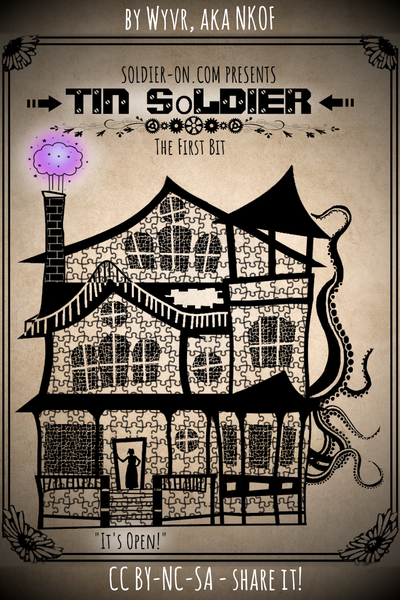Illustration: Ann’s tarot card, The Singer, based on The Star. She is walking on a red carpet with flash bulbs going off, carrying a vase of water, eyes closed with a careless smile. This card is also The Engineer, Milo’s card, reversed.
[PSI-4]
She woke him from his reverie, which was more like dream than memory. The substance of his entire existence was beginning to seem more like something he had read about than something that had actually happened.
Maybe he was still running. Maybe he was still dying…
“Mordecai.” She was kneeling and cradling the child against her. “Here. This is how it is.”
She had washed the blood out of his hair. It was white, fine, and plastered into points like wet feathers. She brushed it back from his face with a careful hand.
It wasn’t terrible. He looked like a person again. There were threads of bluish metal running through the green of his brow where it had been split. The thickest was a finger’s width, above the socket of his right eye. She had remade this in metal, mirroring the left as best she could. Some bone had been incorporated, but no flesh — the mend was bright silver.
There was no eye. An eye was a complicated thing, needing fine work and practice. This was enough for him to deal with, and enough for her to deal with. Later, when she had some better material to use, Milo could help her with an eye.
“Oh, let me,” said Mordecai, uncurling. She deposited the boy in his lap. He held the child limply, afraid to touch. “Does it hurt him?”
“Not yet,” she said. “He’ll sleep for a while.” She made a skittish gesture. “But you know how it is.”
The man nodded. Yes. From experience. And it was not one he would have wished on a child.
The incorporation of metal into the body required quite some adjustment, especially the first time. His own ordeal had been three days — at least she said it had only been that long.
“It’s all right,” he said softly. “We’ll be with him.” He shifted the sleeping body and held it against him. “He’s so hot…”
“He will be. I’m going to make him a place in the basement. It’s cooler there, and he needs the quiet. Your room is up against the alley, and that big window…” It had been more of a wall at one point. Now it was mostly window. Windows were altogether easier than walls.
“I’ll tell Milo to leave that radio alone awhile,” she added, “or Ann will.” It was after noon. She was increasingly likely to get Ann.
“I’ll stay with him,” said Mordecai.
“I’ll stay with him,” said Hyacinth. “You will go to bed and lie quietly until I can find a bit of gold and mend you.”
“No,” said Mordecai, but it was difficult to put together a cogent argument, more so to put it into words. “Won’t.”
“You will if I have to solder you in there. Lead weights, I have.”
She sighed and lifted her head. It was better, if not imperative, to change the subject. “Mordecai, the downtown appears to be on fire. Would you have anything to do with that?”
She nodded towards the kitchen window. It was a wide amalgamation of glass, mostly shades of clear, an occasional fragment of red or green or amber. It was slightly higher than the main part of the house, owing to the basement window, and afforded a misty view of Brickdust Row, past Strawberry Square.
There was a distant spire of smoke curling into the sky.
“I don’t know.” He panted a moment, drawing strength. “Yes, but I’m not sure what. I don’t know if…” Another pause for breath. “If it’s what I did or just someone saw what I did.”
“Did they see you?”
“Yes. Must have.”
She closed her eyes. “Did they follow you?”
He shook his head. “If they did, not close. But… I think…”
She finished for him, “They’ll end up here eventually.”
“Yes.”
“I’ll deal with it.”
And that was all she really needed to say. He trusted her that much. He nodded.
A thought occurred, “Mordecai, what happened to Julia?”
He couldn’t look at her while he said it, “I left… I left her. I don’t know.”
Hyacinth tipped her head back to the ceiling and clutched her fingers in her hair. Well. So much for coins.
A voice called from the main room. It was low and brassy, with just a hint of irony concealed by obvious good humour. Mordecai thought that Ann sounded like rosin being drawn across a bow.
“Cin, dear? I’m going to the market. Is there anything you can afford? Cin?” Then, with mild concern, “Shall I fill a vase of…?”
A vision in pink taffeta swept into the kitchen. Ann frequently swept places, though she much preferred the staircase. Her room was at the top. She shared a narrow bed and a closet with Milo.
The two of them were never seen together.
Pink taffeta was for Tiw’s Day, as was the farmer’s market on South Hollister, a short bus ride away.
“Oh, no, who is it?” she cried.
Gods, I hate your hair, thought Hyacinth reflexively. Give me some of that hair.
It was a burnished red with faint natural waves. She wore it loose and cascading and it fell almost to her waist. (Milo pulled it into a tight braid and tucked it under his shirt collar for work.)
Hyacinth’s own was faint yellow, like a bottle blonde, and always a little crispy from the heat. If she let it get below shoulder length it became utterly unmanageable. David would’ve been ashamed of her.
Her hands went up and slipped the loose strands back into the tie. “It’s Erik,” she said.
“Erik!” said Ann. She knelt crunchily at Mordecai’s side. “Oh, dear child, what happened? Let me see. Em, please…”
Mordecai withheld the boy with a frown, but a moment later he loosened his grip and let Ann see… a little.
“Oh, no, no, his dear little face…” said Ann.
“Why is everything always ‘dear’ with you?” said Mordecai.
“What happened to him?” said Ann.
Mordecai slumped, all hostility gone, and let the child loose in his lap. His hands folded into each other, long fingers nervously washing. “There were some horses.” A breath. “He got away from me.” A breath. “He likes horses.”
Ann shook her head, with a hand pressed over her mouth. “Horses aren’t safe,” she said. “Mordecai, you…”
“I know, Ann. He knows. I tell him. He doesn’t listen.”
“He’s just so little,” Ann said. “You can’t… You know you can’t…” She shut her eyes and shook her head, setting it aside. “Em, you sound just awful. What happened to you?”
The red man shrugged. “Ran,” he said.
“All the way from downtown, it looks like,” Hyacinth said. She rolled into a crouch and scooped the child from Mordecai’s lap.
Mordecai said, “No… No…” but he dared not make a grab for the boy. He sat sprawled and allowed it.
“I’m going to put him on the cot in the basement,” Hyacinth said. “It’s quieter there. Ann, will you tell Milo?”
“He’s listening, Cin,” said Ann. “But isn’t there anything else I can do?”
Hyacinth nodded to Mordecai. “Get him to bed and keep him in there. Please. And, I don’t think it’s a good idea to go to the market today. Or anywhere at all.”
“No,” said Ann. “No, you’re right. I’ll tell the others.”
“Thank you, but Barnaby hardly comes down and Maggie won’t break for dinner for another couple hours. Please get him to bed first.” She left with the boy.
Ann slipped an arm around Mordecai. He was rail thin, down to a vest and shirtsleeves, and soaked with sweat. There was a faint red stain on the breast of the grey fabric.
“I think the floor must not be terribly comfortable, Em, dear,” she said, too brightly. “What if you help me find your room? Hmm?”
He frowned thunderously and shrank away. “I do not want you. I am not going…” He coughed and shuddered. “Stop helping me!”
“No, my love, I’m afraid you’ll have to put up with me a little longer. You can walk, can’t you? Yes, that’s right.”
He was unsteady, and didn’t seem liable to remain upright without assistance, which meant she could pretty much drag him where she wanted him. She didn’t really need any help to find the room.
Her dress got rather badly trodden on negotiating the dining room stair. She didn’t have enough hands to pick up the hem and keep him from flinging himself in the general direction of the basement.
There was the ghost of a number in the paint on the door, and little holes where the nails had been removed. It said “102.” It neither opened nor closed properly. It was held on with cord at the moment — Hyacinth had taken all the hinges for those poor burned girls.
Inside, there were two mattresses on the floor, and a faded Farsian rug. There was a single table, rather badly sagging. The top was littered with sheet music, some of which was spilling onto the floor. Most of it was cheaply printed folios, though a few were sketched in with pencil. Mordecai did his best to keep current, though he preferred the old standards of silent cinema.
There was a wooden horse standing guard beside the smaller bed. It was dressed in a bright red ribbon.
Oh, no, the poor thing, thought Ann. I wonder if he’ll want that anymore? But she shouldn’t move it, not now. Em might take that entirely the wrong way. She nudged back his blanket with the pointed toe of her boot and let him down on the wrinkled sheet.
“There, my darling. Now let’s have your precious little shoesies off.” She picked one up and plucked at the laces.
“I am old enough to be your father,” the red man said.
“Ah, but only just,” Ann said, smiling. She mated his shoes and set them neatly by the door.
There was a closet, separated by a curtain. She racked this aside and stuck both hands in. “Now, where have you hidden your nightclothes?” She peeked back over her shoulder and teased, “Or have you any at all?”
“I sleep this way,” he muttered, arms folded across his chest.
“Mordecai, I shall not allow you to sleep in a suit and tie. Tight clothing strangles the brain.”
“You wear corsets,” he said.
“Fashion is a cruel mistress,” she replied. “Not that you’d know about it. Oh, here’s one!”
She drew out a white flannel shirt and danced it by the wooden hanger. “Now, can you manage all those awful little buttons or do you need a hand?”
He stared, gape-mouthed, at his overly precious housemate. It was as if she thought she could distract him from a rainy day with a kiss on the head and a puppet show. “I will not undress with you in here!” He groped for an insult that would make her flee in tears, “You… You… Figment! Oh… Overgrown imaginary friend! De… Deranged product of… of a…” No, he had already said “deranged.” He wanted to cry. “Not… Not-real person…”
“I respect your modesty,” she interrupted. “But I’m afraid you will not remain in bed without me in here, so you see how it is.” She sat beside him. First she undid the tie, then the vest.
Mordecai put his face in his hands. She had to work around him to get at the shirt. “Is there any possible way,” he said, “that you could stop being you for a minute, Ann?”
She actually laughed, though it came off a bit theatrical. “Ah, ha, ha. Oh, no. Milo’s just useless with things like this. He goes all to pieces. He’s so sensitive. Arms up!”
He obeyed, there was really no other way past, and she pulled the nightshirt down over his head.
She put out her hands. “All right, Em. Belt and trousers. Or I’m going after them myself.”
He recoiled in horror, although his hands dropped straight to his waist to show willing. “Don’t look at me. It’s enough that you’re in here. Don’t look at me.”
She shifted and turned her head. “You’re a silly old thing.”
“Yes.” He gave her the belt, and, after a brief struggle, the trousers. This required quite some effort and left him curled up in a ball and gasping.
Ann leaned over him and touched his brow. “You really have hurt yourself, haven’t you? That was rhetorical,” she informed his open mouth. “No point arguing with an imaginary person, now, is there?”
She folded the trousers and put them on the table, then coiled the belt — it was missing its buckle and stuck neatly to itself with a charm — and put it on the trousers. “You look a bit ridiculous. All undressed but argyle socks.”
“You have. My dignity,” he said. “Leave me. My socks.”
“As you like,” she said. “I suppose it doesn’t really matter. Let’s have that blanket.” He moved his feet so she could pull it out, then she pulled it over, up to his chin. He uncurled and rolled onto his back, staring up at the cracked ceiling and breathing hard.
Slow, he told himself. Slow. They’ll let me out of here if I can just go slow.
But he couldn’t go slow. He couldn’t get air enough. When he tried to draw it deeper, something pinched inside of him and refused.
He was still, very still. He needed less when he was still, and he did slow a little, but he still didn’t sound right. They would never let him go like this.
He was so damn broken.
Ann was picking through the sheet music on the table. “I don’t suppose you’ve got ‘My Melancholy Blues’ in here, do you, Em? That’s my signature piece. I’ve got it backwards and forwards, but I could always use a little rehearsing, you know? And it’s not as if we can keep a piano in the house. I wouldn’t dare try. What if…”
He spoke without moving, “I would like a cup of tea.”
She continued to leaf through the music, “You would like me to go away so you can try to get up.”
“There’s a jar of mentholated oil in the bathroom.”
“Which is a bit of a pity, because it’s going to have to stay there for now. You ought to keep one in here, I think.”
“Go away.”
“Go to sleep.”
“I can’t,” he said.
“You will,” she replied. “You’re in no shape. If you keep pushing like this, you’re just going to pass out. And when you wake up, you shall have mentholated oil and tea.”
He shut his eyes and was still. His breathing softened.
“I know you’re faking, Em.”
“I hate you,” he said.











Comments (0)
See all